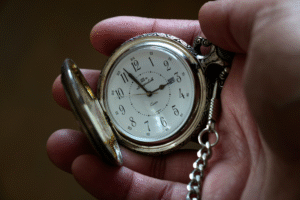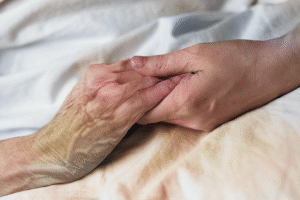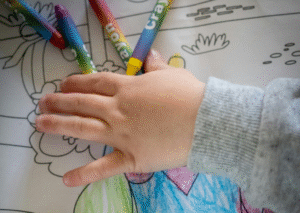By Jodie Sadowsky
I.
My mom tugs my nightgown over my head. I am trying to wake up, but it’s still night. She lifts me up and stretches a blue sweatsuit on me, the one with the rainbow stripes on the wrists and the collar and the ankles. Next, socks, and I am dressed, and she’s going to get my baby sister ready.
She makes me promise not to go back to bed. We are going on a plane to Florida to see my grandparents. My big sister didn’t want to go without Daddy, but he is gone somewhere, and we don’t know where or when he is coming back. So we are going, and I will help Mommy, or at least not make her scream at me or close the bathroom door and cry.
I sit up and lean against my bedroom wall, cool on my cheek. A pale stream of light sneaks in around the window. I pull the blinds up to peek out. It’s grey out, not black like inside. I see my friend’s red house across the street, her driveway dark and empty.
The grey starts to disappear. Morning is coming, a bluish white, and a man is walking in the middle of our street. He wears small spectacles and has a white beard, starting just under his nose and running all the way around his mouth and extending below his chin. He reaches into light-colored denim overalls and finds his pocket watch. He flips it open and studies it before sliding it back into his bib.

This image of him will stay with me for decades, and now that I am writing it down, probably for all my days. I will never be sure if he was really there—a man dressed as a farmer lost in our suburban neighborhood one December morning—or if I fell back asleep and dreamed I saw God or Father Time or Santa Claus, or if maybe I conjured up the whole scene because I needed to know someone was keeping track of me.
II.
In the tiny alcove outside her apartment, my grandmother has a ceramic leopard planter with some fake grasses and plastic American and Israeli flags.
In the bedroom, my mom and her brother sit tucked in chairs on either side of their mother. Grandma’s queen bed and peach bedspread are gone, a hospital bed in their place.
“Mom, Jodie’s here. I told you she was coming.”

“I’m here, Grandma,” I echo. “I love you so much.” I rub her shoulder, her arm, hold her warm hands and her worn face. Why hadn’t I touched her wrinkled, freckled skin more?
She barely opens her eyes, but she mouths love you. Her body, thin and small, so slight beneath the sheets. My mom climbs in bed beside her, talking in a childish voice I hardly know.
“Oh, Mommy, we’re OK. You can go. Daddy is there.”
I imagine their reunion—my grandfather finally seeing his Pearl after twenty-one years—with the stream of boyfriends from her widowed years lining up behind him. Hy, whose cancer radiation limited him to eating pulverized food for years but never stopped him from painting fountains and piazzas on giant canvases. Seymour, who scolded me—you don’t take a girl from a guy on a Saturday night—when I surprised my grandma with a visit and Girls’ Night theater tickets.
“We won, Ma,” my uncle starts chanting. “We made it. We won.”
He is a little boy rushing into their apartment in Queens after a baseball game. He is 60 years old, giving a final cheer for the little girl who left her Jewish village in Europe a few years before it would be rendered extinct by the Holocaust. The ten-year-old who boarded the steamship in Poland on a child’s half-fare ticket, but waited, alone, at Ellis Island, until her blind father returned with enough money to pay the full fare demanded on arrival in New York. The girl who started school in America from kindergarten again because she didn’t speak English, but then caught up so fast and ran numbers so well in her head that she became the brains in the business she built with my grandfather. The lady who was widowed too young but still danced and watched the stock market and beat everyone at cards and would leave this earth on the eve of a worldwide pandemic with eight grandchildren and fifteen great-grandchildren and enough money for her children to fight over.
Her breathing quickens, then slows. She shifts, then slumps.
“Go in peace,” her sister says.
“Mommy, Mommy,” my mother says.
“We won, Ma,” her son says again.
“I knew she was waiting for someone,” the hospice nurse says, looking at me and then at her watch. “They always wait.”
I should have come sooner, I think. And if I hadn’t come, would she have kept waiting?
She tried to say goodbye to me on the phone a few days ago. She was confused, asking me questions. “Did they have the funeral yet? Did they put my picture up in the lobby? Make sure it’s a pretty picture.”
The nurse shuts off the oxygen and disconnects the ports. She asks for my help with the narcotic disposal paperwork. She counts the vials and shows me their names as I inject the extra morphine and Ativan into a diaper. I sign the bottom of the page.
I thumb through a shoebox of photographs until I find the one to post in her building lobby: Pearl in a navy sequined, off-the-shoulder gown, her blonde hair curled and coiffed, her face aglow in pink lipstick and blue shadow. Everywhere she went, she dazzled.
III.
My daughter, age three, is coloring beside me in a pink twirly dress dotted with lollipops. She hums the alphabet while I give my board report: how much our new gift basket fundraiser cost, how much we raised, how many families participated. The synagogue president thanks me and thanks my little one, too. We smile and say goodbye and walk past dusty library shelves of old prayer books and settle in the worn chairs in the lobby.
“Read, Mama.”
I don’t have any books, so we play our game. I clap my palms together and open them wide. “In the light of the moon, a little egg lay on a leaf.”

“Next page,” Hallie calls, touching my hands. I tap my palms together, then spread them again.
“One Sunday morning, the warm sun came up and out of the egg came a tiny and a very hungry caterpillar.”
She giggles and I keep reading. We get as far as Wednesday, when the hungry caterpillar eats through two plums but still he needs more. The doorknob turns, and the rabbi exits the library.
“Ready for Tot Shabbat, Hallie? C’mon and follow me to the sanctuary.” He keeps walking as I reach for my bag.
“Let’s go, Mommy,” Hallie says. “Let’s go follow God.”
Still sitting, I laugh and pull her close. “Honey,” I tell her, “remember? That’s Rabbi Bennett.
He talks about God a lot, but he’s not God. He’s the leader of our temple. And your teacher.”
“OK, come on!” she says, pulling my hands. But I think that for her whole life, whenever she hears the word God, even if she doesn’t believe in God or is sure God is a woman, she will first think of this sweet old man who always gets her name right in a world where almost everyone calls her Haley or Holly. She will think of this man in a grey suit who plays the guitar and makes funny faces when he leads us in singing loud and sometimes a little off-key about God and peace and blessings.
Jodie Sadowsky is a Connecticut writer whose work has appeared in Brevity Magazine, The Huffington Post, CNN, and The New York Times. She is the author of a forthcoming picture book, A Sukkah for Bella. Jodie is currently co-writing a family memoir, told in distinct voices, about her father’s disappearance.